九年级英语新目标上 unit 3 重点、难点、考点及疑点注释
人教版初三英语上unit3知识点讲解及练习(K12教育文档)
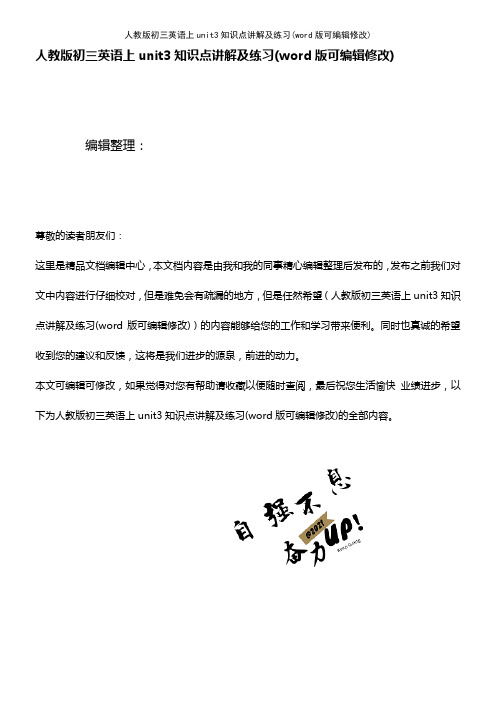
人教版初三英语上unit3知识点讲解及练习(word版可编辑修改)编辑整理:尊敬的读者朋友们:这里是精品文档编辑中心,本文档内容是由我和我的同事精心编辑整理后发布的,发布之前我们对文中内容进行仔细校对,但是难免会有疏漏的地方,但是任然希望(人教版初三英语上unit3知识点讲解及练习(word版可编辑修改))的内容能够给您的工作和学习带来便利。
同时也真诚的希望收到您的建议和反馈,这将是我们进步的源泉,前进的动力。
本文可编辑可修改,如果觉得对您有帮助请收藏以便随时查阅,最后祝您生活愉快业绩进步,以下为人教版初三英语上unit3知识点讲解及练习(word版可编辑修改)的全部内容。
Unit 3: Teenagers should be allowed to choose their own clothes 。
【重点短语】take the test 参加考试pass the test 通过考试fail a test 考试失败be strict with+人 对某人严格be strict in+事物 对某事要求严格stay up 熬夜clean up 打扫 整理learn from each other 互相学习concentrate on 专注于one ’s own 某人自己的the other day 前几天,几天前= a few days agohave an opportunity to do sth 。
有机会做某事 =have a chance to do/ of doing every other day 每隔一天 (每两天) = every two days at present 现在,目前 in this way 用这种方法 in the way 挡道的,妨碍人的 on the way 在路上 on one ’s way to 在某人去…的路上 by the way 顺便说(问) be serious about 对…认真 care for 在乎、关心【语言点】 1. Teenagers should be allowed to choose their own clothes 。
人教版九年级英语unit3知识点,单词讲解
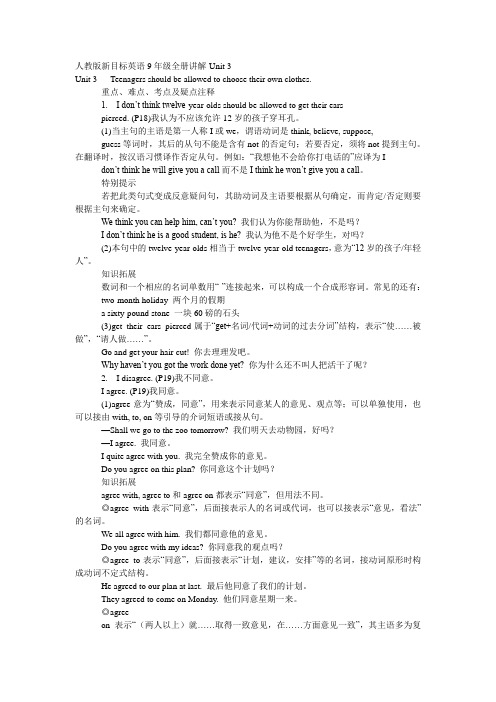
人教版新目标英语9年级全册讲解-Unit 3Unit 3 Teenagers should be allowed to choose their own clothes.重点、难点、考点及疑点注释1. I don’t think twelve-year-olds should be allowed to get their earspierced. (P18)我认为不应该允许12岁的孩子穿耳孔。
(1)当主句的主语是第一人称I或we,谓语动词是think, believe, suppose,guess等词时,其后的从句不能是含有not的否定句;若要否定,须将not提到主句。
在翻译时,按汉语习惯译作否定从句。
例如:“我想他不会给你打电话的”应译为I don’t think he will give you a call而不是I think he won’t give you a call。
特别提示若把此类句式变成反意疑问句,其助动词及主语要根据从句确定,而肯定/否定则要根据主句来确定。
We think you can help him, can’t you? 我们认为你能帮助他,不是吗?I don’t think he is a good student, is he? 我认为他不是个好学生,对吗?(2)本句中的twelve-year-olds相当于twelve-year-old teenagers,意为“12岁的孩子/年轻人”。
知识拓展数词和一个相应的名词单数用“-”连接起来,可以构成一个合成形容词。
常见的还有:two-month holiday 两个月的假期a sixty-pound stone 一块60磅的石头(3)get their ears pierced属于“get+名词/代词+动词的过去分词”结构,表示“使……被做”,“请人做……”。
Go and get your hair cut! 你去理理发吧。
新目标九年级unit3知识点精华版

Unit3 Could you please tell me where therestaurants are?短语归纳1. a pair of 一对,一双,一副(trousers, gloves, shoes,socks. Glasses, scissors)2.get some money 取钱3.get some magazines 得到一些杂志4.get some information about…获取有关……的一些信息5.go along =go down/up 沿着…走6.Pardon me? 什么,请再说一遍=Pardon?= I beg your pardon.7.look forward to (doing) sth. 盼望期待8.pass by 路过经过9.between A and B 在a和b之间10.on the right/left 在右边/左边11.go to the third floor 去三楼12.turn left/right 向左/向右转13.go past 经过路过go along=go down 沿着14.over there 在那边15.hold my hand 握住我的手16.at first 起初,最先17.on one’s / the way to 在去……的路上18.fascinating 令人着迷的fascinated 着迷的(be fascinated with…)19. a little earlier 早一点儿20.ask for help寻求帮助21. a good place to eat 一个吃饭的好地方22.in different situations 在不同的情况下23.get to 到达e on 快点请过来25.the shopping center 购物中心26.the corner of....... 的角落/拐角处27.similar requests for direction对问路的类似请求28.be similar to/in 与…相似/在…方面相似29.lead into 导入引入30.at that time 在那时on time 准时, 按时in time 及时at times=sometimes 有时,偶尔by the time…到…的时候at the same time 同时31.for the first time 第一次用法集萃1.not ……· until……直到……才……2.let’s do sth 咱们做某事吧!3.start doing sth 开始做某事=start to do sth.start/ begin with 从/以…开始4.be excited about 激动,兴奋be excited to dobe excited that5.spend time (in) doing sth 花费时间做某事6.be busy with sth. 忙于(做)某事be busy (in) doing sth7.thank sb for doing sth 为做某事而感谢某人8.would like to do sth 想要做某事9.rush to do sth 匆忙做某事10.suggest sth (to sb. ) 建议某事suggest doing sth 建议做某事suggest that…… (should ) do 建议make a suggestion 提出建议11.request sth from sb. 向某人要求某物request sb to do sth 要求某人做某事request that …… (should ) do 要求12.depend on 依赖,依靠;指望=count on=rely ondepend on sb to do sth取决于depend on +wh宾从depend on it that宾从重点句子1.Could you please tell me where the restrooms are?你能告诉我洗手间在哪里吗?2.Could you please tell me how to get to thebookstore?请你告诉我如何去书店好吗?3.I wonder where we should go next.我想知道接下来我们应该去哪儿?4.Just go along Main Street until you pass CenterStreet.就沿着主大街向前走, 一直到你经过中心大街.5.Go past the bookstore. 经过书店.6.You never know until you try something.有些事情你不去尝试,永远不知道你能行.7.The clerk suggests they go to the Computermuseum. 职员建议他们去计算机博物馆.8.Good speakers change the way they speak indifferent situations.优秀的说话者在不同情形会改变他们的说话方式.语法全解一.宾语从句:是指在主句中充当宾语成分的从句。
新人教版九年级unit3知识点概述
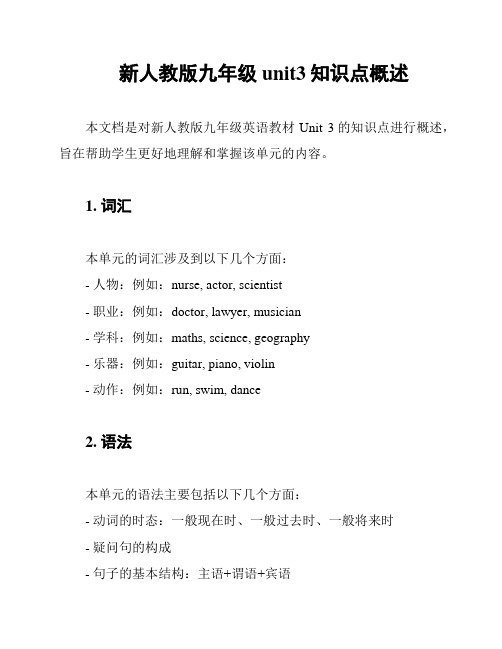
新人教版九年级unit3知识点概述
本文档是对新人教版九年级英语教材Unit 3的知识点进行概述,旨在帮助学生更好地理解和掌握该单元的内容。
1. 词汇
本单元的词汇涉及到以下几个方面:
- 人物:例如:nurse, actor, scientist
- 职业:例如:doctor, lawyer, musician
- 学科:例如:maths, science, geography
- 乐器:例如:guitar, piano, violin
- 动作:例如:run, swim, dance
2. 语法
本单元的语法主要包括以下几个方面:
- 动词的时态:一般现在时、一般过去时、一般将来时
- 疑问句的构成
- 句子的基本结构:主语+谓语+宾语
3. 句型
本单元主要研究了以下几种句型:
- What do you want to be when you grow up?
- I want to be a...
- Why do you want to be a...?
4. 文化背景
本单元涉及到一些与职业和学科相关的文化背景,例如不同国
家的职业分布和教育体系差异。
5. 阅读理解
本单元的阅读理解部分主要针对学生的阅读理解能力进行训练,通过阅读文章并回答问题,提高学生的阅读理解能力和批判思维能力。
总结
本文档对新人教版九年级英语教材Unit 3的知识点做了简要概述。
通过掌握这些知识,学生将能够更好地运用英语谈论职业和学科,并提高阅读和理解能力。
新目标九年级英语Unit3每课时备课重难点归纳
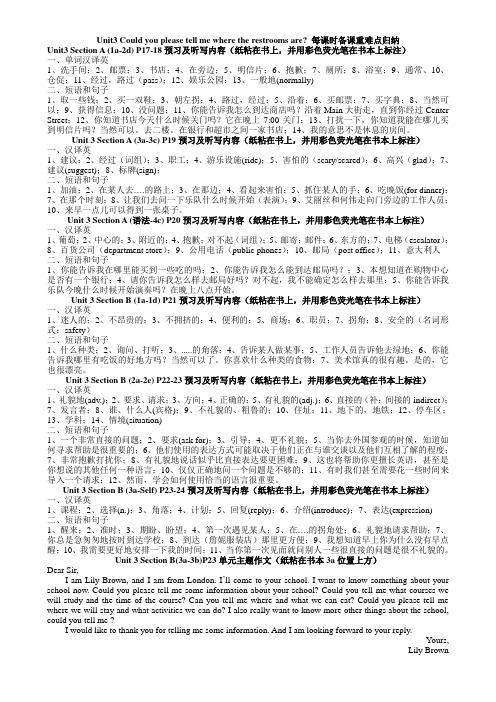
Unit3 Could you please tell me where the restrooms are? 每课时备课重难点归纳Unit3 Section A (1a-2d) P17-18预习及听写内容(纸粘在书上,并用彩色荧光笔在书本上标注)一、单词汉译英1、洗手间;2、邮票;3、书店;4、在旁边;5、明信片;6、抱歉;7、厕所;8、浴室;9、通常、10、仓促;11、经过,路过(pass);12、娱乐公园;13、一般地(normally)二、短语和句子1、取一些钱;2、买一双鞋;3、朝左拐;4、路过,经过;5、沿着;6、买邮票;7、买字典;8、当然可以;9、获得信息;10、没问题;11、你能告诉我怎么到达商店吗?沿着Main大街走,直到你经过Center Street;12、你知道书店今天什么时候关门吗?它在晚上7:00关门;13、打扰一下,你知道我能在哪儿买到明信片吗?当然可以。
去二楼。
在银行和超市之间一家书店;14、我的意思不是休息的房间。
Unit 3 Section A (3a-3c) P19预习及听写内容(纸粘在书上,并用彩色荧光笔在书本上标注)一、汉译英1、建议;2、经过(词组);3、职工;4、游乐设施(ride);5、害怕的(scary/scared);6、高兴(glad);7、建议(suggest);8、标牌(sign);二、短语和句子1、加油;2、在某人去….的路上;3、在那边;4、看起来害怕;5、抓住某人的手;6、吃晚饭(for dinner);7、在那个时刻;8、让我们去问一下乐队什么时候开始(表演);9、艾丽丝和何伟走向门旁边的工作人员;10、来早一点儿可以得到一张桌子。
Unit 3 Section A (语法-4c) P20预习及听写内容(纸粘在书上,并用彩色荧光笔在书本上标注)一、汉译英1、葡萄;2、中心的;3、附近的;4、抱歉;对不起(词组);5、邮寄;邮件;6、东方的;7、电梯(escalator);8、百货公司(department store);9、公用电话(public phones);10、邮局(post office);11、意大利人二、短语和句子1、你能告诉我在哪里能买到一些吃的吗;2、你能告诉我怎么能到达邮局吗?;3、本想知道在购物中心是否有一个银行;4、请你告诉我怎么样去邮局好吗?对不起,我不能确定怎么样去那里;5、你能告诉我乐队今晚什么时候开始演奏吗?在晚上八点开始。
人教新目标九年级Unit 3 知识点归纳
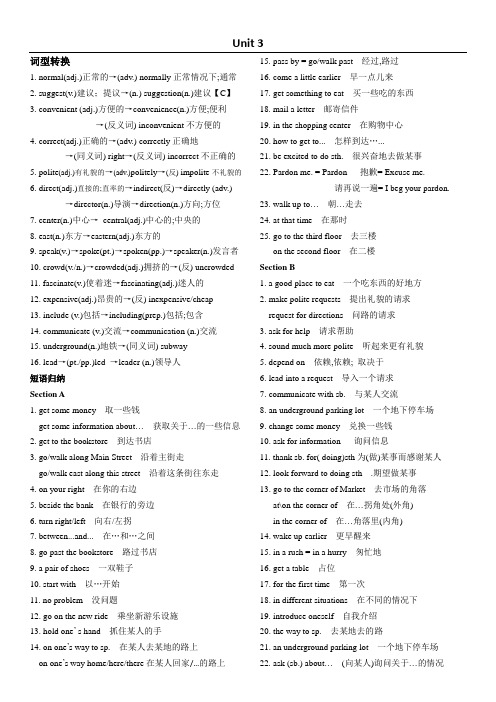
词型转换1. normal(adj.)正常的→(adv.) normally正常情况下;通常2. suggest(v.)建议;提议→(n.) suggestion(n.)建议【C】3. convenient (adj.)方便的→convenience(n.)方便;便利→(反义词) inconvenient不方便的4. correct(adj.)正确的→(adv.) correctly正确地→(同义词) right→(反义词) incorrect不正确的5. polite(adj.)有礼貌的→(adv.)politely→(反) impolite不礼貌的6. direct(adj.)直接的;直率的→indirect(反)→directly (adv.)→director(n.)导演→direction(n.)方向;方位7. center(n.)中心→central(adj.)中心的;中央的8. east(n.)东方→eastern(adj.)东方的9. speak(v.)→spoke(pt.)→spoken(pp.)→speaker(n.)发言者10. crowd(v./n.)→crowded(adj.)拥挤的→(反) uncrowded11. fascinate(v.)使着迷→fascinating(adj.)迷人的12. expensive(adj.)昂贵的→(反) inexpensive/cheap13. include (v.)包括→including(prep.)包括;包含14. communicate (v.)交流→communication (n.)交流15. underground(n.)地铁→(同义词) subway16. lead→(pt./pp.)led →leader (n.)领导人短语归纳Section A1. get some money 取一些钱get some information about…获取关于…的一些信息2. get to the bookstore 到达书店3. go/walk along Main Street 沿着主街走go/walk east along this street 沿着这条街往东走4. on your right 在你的右边5. beside the bank 在银行的旁边6. turn right/left 向右/左拐7. between...and... 在…和…之间8. go past the bookstore 路过书店9. a pair of shoes 一双鞋子10. start with 以…开始11. no problem 没问题12. go on the new ride 乘坐新游乐设施13. hold one’ s hand 抓住某人的手14. on one’s way to sp. 在某人去某地的路上on one’s way home/here/there在某人回家/…的路上15. pass by = go/walk past 经过,路过16. come a little earlier 早一点儿来17. get something to eat 买一些吃的东西18. mail a letter 邮寄信件19. in the shopping center 在购物中心20. how to get to... 怎样到达…...21. be excited to do sth. 很兴奋地去做某事22. Pardon me. = Pardon 抱歉= Excuse me.请再说一遍= I beg your pardon.23. walk up to…朝…走去24. at that time 在那时25. go to the third floor 去三楼on the second floor 在二楼Section B1. a good place to eat 一个吃东西的好地方2. make polite requests 提出礼貌的请求request for directions 问路的请求3. ask for help 请求帮助4. sound much more polite 听起来更有礼貌5. depend on 依赖,依赖; 取决于6. lead into a request 导入一个请求7. communicate with sb. 与某人交流8. an underground parking lot 一个地下停车场9. change some money 兑换一些钱10. ask for information 询问信息11. thank sb. for( doing)sth为(做)某事而感谢某人12. look forward to doing sth .期望做某事13. go to the corner of Market 去市场的角落at\on the corner of 在…拐角处(外角)in the corner of 在…角落里(内角)14. wake up earlier 更早醒来15. in a rush = in a hurry 匆忙地16. get a table 占位17. for the first time 第一次18. in different situations 在不同的情况下19. introduce oneself 自我介绍20. the way to sp. 去某地去的路21. an underground parking lot 一个地下停车场22. ask (sb.) about…(向某人)询问关于…的情况知识点总结1.常见的问路句型:(1) Could you please tell me where…is?(2) Could you please tell me how to get to…?(3) Could you please tell me how I can get to…?(4) Could you please tell me the way to…?(5) Excuse me,which is the way to…?(6) Pardon me ,do you know if there is a/an … near here ?(7) Excuse me,would you please show me the way to…? 指路的常用表达方式:直走:Go straight./Go straight head./Go down this road.拐弯:Turn left/ right at the first crossing.Take the first turning on the left/right.指出具体位置:It’s next to the bank/ between the park andthe post office/across from the school.You won’t miss it; It’s on your left/ right.综合指路:(1)Walk along this street, and …is on your left.(2) Go down this way, and turn left at the first crossing ,and you’ll find …is right there , on your left.(3) You can just take No.1 bus, and get off the secondstation. Then you’ll see it2. Could you please (not) do … ? 请你(不要)…好吗?肯定回答:Sure./ Certainly./Of course./No problem./Yes, please.等。
人教版新目标九年级英语上册Unit-3-知识点归纳

人教版新目标九年级英语上册Unit 3 知识点归纳1。
取钱get some money2.买一些杂志/邮票get/buy some magazines3。
获取一些有关小镇的信息get some information about the town4。
买一双鞋get/buy a pair of shoes5。
买一份报纸buy a newspaper6.买一本字典buy a dictionary7.买一些有票buy some stamps8.吃饭have dinner9.怎样到达…how to get to sp10.沿着go along/ go down11。
在银行的旁边beside the bank12.在右边on the right/left13。
在某人的右边on one’s right14.去三楼go to the third floor15.向左转turn left/ right16。
在…之间between …and…17。
走过书店go past the bookstore18。
做…激动be excited to do sth.19。
从/以…开始start/ begin with20.不必匆忙not need to rush21.有……独特之处be special about.。
22。
加油, 过来come on23.休息室 a room for resting24.请再说一次pardon me25.抓住某人的手hold one' s hand26.摇滚乐队 a rock band27。
起初at first28。
在去。
.。
..。
.的路上on one’s way to.。
.29.经过、路过pass by30.开始玩start playing31.沿。
走;走上;走近walk up32.在门边at the door33.在门旁by the door:34。
在那个时刻at that time35。
九年级英语上册第三单元知识点

九年级英语上册第三单元知识点Unit3 Could you please tell me where therestrooms are?一.短语归纳ed to do sth.过去常常做某事2.be afraid of害怕3.from time to time时常;有时4.turn red变红5.take up开始做,从事,占据(时间、空间)6.deal with对付;应付7.not…any more不再8.tons of attention很多关注9.worry about担心10.be careful当心11.hang out闲逛12.give up放弃13.thank about考虑14.a very small number of…极少数的……15.be alone独处16.give a speech做演讲二.用法集萃1.not……·until……直到……猜……You never know until you try something.2.let‘s do sth咱们做某事吧!3.spend time doing sth话费时间做某事4.thank sb for doing sth为做某事而感谢某5.would like to do sth想要做某事6.look forward to doing sth盼望做某事7.It seems(that)…It seems a rock band plays there every evening.8.Could you please tell me...?Could you please tell me how to get to the post office?9.take的用法①take some food take some medicine(=have吃,喝)②take notes做笔记③take one‘s temperature(测量)④It takes sb some time/money to do something(花费,需要)⑤I‘ll take this coat.(=buy购买)⑥take somebody/something to(带领,拿去,取)⑦take a train to Chongqing(乘坐)⑧take off(脱下)10.turn的用法turn to page 80翻到It is your turn.轮到你了。
- 1、下载文档前请自行甄别文档内容的完整性,平台不提供额外的编辑、内容补充、找答案等附加服务。
- 2、"仅部分预览"的文档,不可在线预览部分如存在完整性等问题,可反馈申请退款(可完整预览的文档不适用该条件!)。
- 3、如文档侵犯您的权益,请联系客服反馈,我们会尽快为您处理(人工客服工作时间:9:00-18:30)。
Unit 3 T eenagers should be allowed to choose their own clothes. 重点、难点、考点及疑点注释1. I don’t think twelve-year-olds should be allowed to get their earspierced. (P18我认为不应该允许 12岁的孩子穿耳孔。
(1当主句的主语是第一人称 I 或 we ,谓语动词是 think, believe, suppose,guess 等词时,其后的从句不能是含有 not 的否定句;若要否定,须将 not 提到主句。
在翻译时,按汉语习惯译作否定从句。
例如:“ 我想他不会给你打电话的” 应译为 Idon’t think he will give you a call而不是I think he won’t give you a call。
特别提示若把此类句式变成反意疑问句,其助动词及主语要根据从句确定,而肯定 /否定则要根据主句来确定。
We think you can help him, can’t you? 我们认为你能帮助他,不是吗?I don’t think he is a good student, is he? 我认为他不是个好学生,对吗?(2本句中的 twelve-year-olds 相当于 twelve-year-old teenagers, 意为“12岁的孩子 /年轻人” 。
知识拓展数词和一个相应的名词单数用“ -” 连接起来,可以构成一个合成形容词。
常见的还有: two-month holiday 两个月的假期a sixty-pound stone 一块 60磅的石头(3get their ears pierced 属于“get+名词 /代词 +动词的过去分词” 结构,表示“ 使…… 被做” , “ 请人做……” 。
Go and get your hair cut! 你去理理发吧。
Why haven’t you got the work done yet? 你为什么还不叫人把活干了呢?2. I disagree. (P19我不同意。
I agree. (P19我同意。
(1agree意为“ 赞成,同意” ,用来表示同意某人的意见、观点等;可以单独使用,也可以接由 with, to, on等引导的介词短语或接从句。
— Shall we go to the zoo tomorrow? 我们明天去动物园,好吗?— I agree. 我同意。
I quite agree with you. 我完全赞成你的意见。
Do you agree on this plan? 你同意这个计划吗?知识拓展agree with, agree to和 agree on都表示“ 同意” ,但用法不同。
◎ agree with 表示“ 同意” ,后面接表示人的名词或代词,也可以接表示“ 意见,看法” 的名词。
We all agree with him. 我们都同意他的意见。
Do you agree with my ideas? 你同意我的观点吗?◎ agree to 表示“ 同意” ,后面接表示“ 计划,建议,安排” 等的名词,接动词原形时构成动词不定式结构。
He agreed to our plan at last. 最后他同意了我们的计划。
They agreed to come on Monday. 他们同意星期一来。
◎ agreeon 表示“ (两人以上就…… 取得一致意见,在…… 方面意见一致” ,其主语多为复数形式,宾语是表示事、计划等的名词,而不是表示人的名词或代词,它可以与agree in doing sth替换。
They agreed on the plan.=They agreed in doing the plan. 他们对这个计划意见一致。
特别提示agree with也可以表示“ 某人适应(食物、气候等” 。
The weather doesn’t agree with me. 我不适应这种天气。
(2disagree是 agree 的反义词,相当于 not agree。
3. They talk instead of doing homework. (P19他们会说话而不做作业。
本句中的 instead of 是复合介词,意思是“ 代替” ,后面往往接名词、代词、动名词或介词短语 , of后面的内容是被否定的。
I want that book instead of this one. 我要那本书而不是这本。
We went to swim instead of playing basketball.我们没有去打篮球,而是去游泳了。
特别提示副词 instead 和 instead of意思相同,但用法却不同。
instead 意为“ 代替,顶替” ,常位于句首或句末,可不译。
I didn’t go to cinema. Instead, I went to go shopping.我没有去看电影,我去购物了。
The water here is not good, so I drink coffee instead.这里的水不好,所以我改喝咖啡。
4. Find someone who is allowed to stay up until 11∶ 00 pm. (P20找出被允许熬夜到 11点的人。
(1who is allowed to stay up until 11∶ 00 pm 是一个定语从句,用来修饰前面的someone 。
The man who is smoking is my father. 正在抽烟的那个人是我的父亲。
The foreigner who visited our class is from Canada.访问我们班的那个外国人来自加拿大。
(2stay up在这里是“ 熬夜”, “ 不睡觉” 的意思,相当于 not go to bed。
He stayed up too late last night. 他昨天晚上熬夜到很晚。
She promised the children they could stay up for homework.她承诺孩子们可以熬夜做作业。
5. Do you ever worry that you’ll fail a test? (P21你曾经担心过考试不及格吗? fail 表示考试“ 不及格” 或“ 不通过” ,相当于 not pass。
I think I may fail in the English exam this time.我想这次英语考试我可能不及格。
6. Parents should not be too strict with teenagers. (P21父母对青少年不应该要求太严格。
形容词 strict 是“ 严格的” , “ 严厉的” 的意思,对人严格时用介词 with ,对工作等严格时用介词 in 。
The teacher was very strict with his students. 这位老师对学生非常严厉。
He is always strict in his work. 他总是对工作要求很严格。
7. The other day, my friends and I talked about the rules that we have inschool. (P22那天,我和我的朋友们谈论我们学校的各种规章制度。
(1the other day表示“ 几天以前,不久前的一天” 。
I saw him in the street the other day. 不久前的一天,我在街上看到了他。
Li Ming and I went shopping the other day. 几天以前我和李明去购物了。
(3本句中的 get to 意为“ 开始,着手” ,后面接动词的 -ing 形式,表示“ 着手或开始做某事” 。
We get to working after a short rest. 我们歇息了一会儿后就开始干起活来。
He got to wondering why he was in the job.他对自己为什么会从事这份工作感到诧异。
8. We think young people should look smart and so we would like to wearour own clothes. (P22我们想年轻人应该看起来漂亮潇洒,因此我们想穿自己的衣服。
(1形容词 smart 意为“ 聪明的,机敏的,精明的” ,相当于 clever 。
The dolphin is a smart animal. 海豚是聪明的动物。
He looks very smart in his suit. 他穿上他的西装看起来很帅气。
(2would like意为“ 想要” ,相当于 want ,后面接名词或动词不定式。
I would like a cup of coffee. 我想要杯咖啡。
I didn’t want to go to the cinema. I would like to stay at home.我不想去看电影,我想呆在家里。
◎ would like sb to do sth表示“ 想要某人做某事” 。
I’d like you to help me with my homework. 我想要你帮助我做家庭作业。
特别提示feel like 也可以译为“ 想要” ,有时可以与 would like 替换;其后接名词或动词的-ing 形式。
She feels like a good meal. 她想美美地吃一顿。
I feel like seeing a film tonight. 我今晚想去看电影。
9. Our teachers believe that if we did that, we would concentrate more onour clothes than our studies.(P22我们老师相信,如果我们那样做了,我们就会将注意力更多地集中在服装上, 而不是学习上。
(1believe是及物动词,意为“ 相信” ,其后可跟名词或从句。
I don’t believe his story. 我不相信他的故事。
I believe he told us the truth. 我认为他告诉我们的是真的。
◎ believe in表示“ 信任” (即 trust 。
She doesn’t believe in God. 她不信奉上帝。
